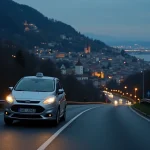The Role of AI in Urban Planning
The integration of AI in urban planning is transforming how cities evolve into smart cities, focused on sustainable development. AI technologies like machine learning and data analytics enable urban planners to design cities that efficiently use resources and adapt to changing environments. AI-powered tools can simulate various urban design scenarios, predicting environmental impacts and optimizing resource allocation, which is crucial for creating sustainable urban environments.
For example, AI can analyse traffic patterns to design better road networks, reducing congestion and lowering carbon emissions. By assessing large datasets, AI helps identify optimal locations for green spaces, balancing urban density with environmental needs. This precise planning results in improved air quality and reduced urban heat, contributing significantly to sustainable development.
Also to see : Revolutionizing Building Management: Harnessing IoT for Smarter and More Efficient Solutions
Smart cities, such as Singapore and Copenhagen, have successfully integrated AI solutions in managing urban infrastructures. These cities showcase the effectiveness of AI-driven innovations in addressing urban challenges. From smart grids to water management systems, AI applications are enhancing city operations, making them more resilient and adaptable.
Implementing AI in urban environments not only supports sustainable development but also opens pathways to enhanced livability and economic growth, establishing a model for future urban planning.
In parallel : Empower your small business with the pomelli AI marketing tool
Benefits of AI-Driven Green Urban Development
The benefits of AI in sustainability are profound, particularly in the field of green architecture. By utilizing intelligent planning, urban areas can achieve a significant reduction in their carbon footprint. For instance, AI systems can monitor energy use in real-time and adjust consumption based on demand, leading to reduced energy waste. This not only benefits the environment but also cuts costs for cities, making sustainable practices economically attractive.
Enhancements in urban livability extend beyond just environmental benefits. AI-driven solutions create healthier living conditions by designing cities that prioritize air quality and green spaces. Intelligent planning improves public health outcomes by reducing pollutants and increasing access to recreational areas, which in turn encourage outdoor activities and social interactions.
Moreover, investing in AI for urban environments promises substantial economic advantages. AI systems help optimize resource allocation, directing funds to critical areas and ensuring projects meet sustainability standards. Cities leverage these technological tools to create efficient infrastructures, fostering economic growth by attracting businesses and boosting tourism. The long-term economic savings from sustainable practices and energy efficiency represent a strong financial incentive for adopting AI in urban planning.
Case Studies of Successful AI Implementations
Examples of thriving AI implementations in cities offer insights into the potential of technology to revolutionise urban environments. These innovative urban solutions demonstrate tangible benefits in areas like traffic management and waste reduction.
Example of a Green Smart City
Singapore is often cited as a leader in AI-driven urban planning. It employs smart city technologies extensively, enhancing sustainability through intelligent monitoring systems. By strategically deploying AI, the city optimises energy use and improves public services, setting a benchmark for green urban development worldwide.
Adaptive Traffic Management Systems
Copenhagen’s adaptive traffic systems represent a cutting-edge application of AI, minimising congestion and reducing carbon emissions. By analysing real-time traffic data, these systems adjust traffic signals and manage flow efficiently. As a result, urban transit becomes smoother and more sustainable, directly linking AI to improved air quality and public health.
AI-Enhanced Waste Management Solutions
Tokyo’s approach to AI-enhanced waste management is exemplary, showcasing increased recycling rates and reduced waste. AI systems predict waste generation patterns and optimise collection routes, thereby enhancing efficiency. The success of these implementations illustrates the broad potential of AI to foster sustainable practices in urban settings.
Challenges in Implementing AI for Urban Sustainability
Navigating the challenges in AI urban planning requires addressing several critical issues. One major barrier is the technological and infrastructural hurdles that cities face. Many urban areas lack the advanced infrastructure necessary for seamless AI integration, which is essential for effective sustainable development. Upgrading these systems demands significant investment in both technology and skilled human resources.
Additionally, resistance from policymakers and community stakeholders poses another significant challenge. There can be a reluctance to adopt AI-driven solutions due to concerns over job displacement and the cost of implementation. Engaging the community and demonstrating the tangible benefits of AI in urban planning can help overcome this reluctance.
Data privacy concerns also play a crucial role in hampering the deployment of AI systems. With AI technologies handling enormous data sets to optimize urban environments, safeguarding personal and sensitive information becomes paramount. Ensuring robust data protection measures are in place is essential to gaining public trust and facilitating widespread adoption.
Overcoming these challenges involves not only technical solutions but also fostering collaboration between government entities, tech companies, and community groups. Emphasizing transparency and inclusivity can pave the way for effective AI-driven urban sustainability initiatives.
Future Trends in AI and Green Urban Planning
The future of AI in urban development is set to revolutionise how cities achieve sustainability. Emerging technologies are paving the way for smarter urban planning, focusing on green technology trends and sustainability innovations. These advancements enable cities to become more resilient and adaptable to environmental changes, ensuring the well-being of urban populations.
One exciting development includes the use of IoT (Internet of Things) devices to monitor and optimise energy consumption in real-time. These devices can work alongside AI to predict and manage energy use, significantly reducing waste and costs. Furthermore, the incorporation of AI in transportation aims to enhance public transit systems, promoting eco-friendly modes of transport and reducing urban congestion.
Increased collaboration between cities and tech companies holds immense potential for achieving sustainable development goals. By working together, cities can harness cutting-edge technologies and foster innovation tailored to specific urban challenges.
Predictions for AI’s role in sustainability suggest a growing focus on renewable energy sources and breakthroughs in smart building technologies. These trends indicate a promising future where AI-driven solutions become central to developing cities that prioritise environmental health and quality of life.




